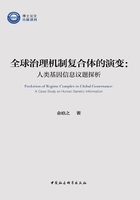
Abstract
Regime complex is defined as an array of partially overlapping and nonhierarchical institutions governing a particular issue area,which is characterized as diversified governance actors and institutions.It is noticed that regime complex has become common phenomenon in many governance issues,such as climate change,cyber space and global energy governance etc.However,existing description and analysis of regime complex has rarely explored the cause and dynamics of regime complex.This paper tried to answer two questions: first,how does regime complex generate and evolve?Second,what are the key factors which affect the evolution of regime complex? Based on the perspective of historical institutionalism,this paper sets up theoretical framework to reveal the evolution model and dynamics of regime complex.
In the case study on global governance of human genetic information,this paper analyses the evolution of regime complex through the method of process tracing.Based on 49 interviews in five countries and plenary historical materials,it identifies three critical junctures within which significant changes occur.In each critical juncture,technology development brings about new governance problems.Under particular governing context,whether actors' power matchs the governing problem or not decide their opportunity to adjust and develop new governing institutions.Meanwhile,actors following diversified institutional logics generate different governing motiva tions,which lead to the evolution of regime complex.
The conclusion is,first,the evolution model of regime complex is changing process between stable and unstable period.Moreover,the evolution of regime complex is caused by external and internal factors.First,external shocks like new technology development bring about new governance issues,making governance architecture unstable.Second,potential actors with different power exercise condition and incentives further determine the evolution direction.In the era of globalization,military power,political power,economic power and ideational power are diffused among different actors.Actors get chance to change and develop governance institutions if they have the proper social power to deal with certain governance issue.Meanwhile,different actors follow diversified institutional logics,so their incentives to handle the same governance issue are different.
Theoretical contribution includes three aspects.First,the analysis of evolution is valuable for the theoretical development in the research field of regime complex.Second,the theory of regime complex evolution adds new dimension in the literature of global institutional change.Third,the analysis of critical juncture in global governance widens the research scope of historical institutionalism.Fourth,the process tracing of the long-term institutional change in global governance is conducted in new research paradigm,practicing the“third generation of global governance research”initiative.
Finally,this research has some policy implications.First,this research offers an analysis framework to identify external shocks and potential actors,which is helpful to predict current trends in global governance.Second,the case study shows the importance to concern about the influence of new-generation technology revolution,especially technology related to internet and big data in changing global governance architecture.Third,it suggests the importance of strengthening Chinese non state actors' involvement in regime complex,so as to deepen the leadership in the global governance.
Key Words: global governance; regime complex; human genetic information; evolution model; evolution dynamics